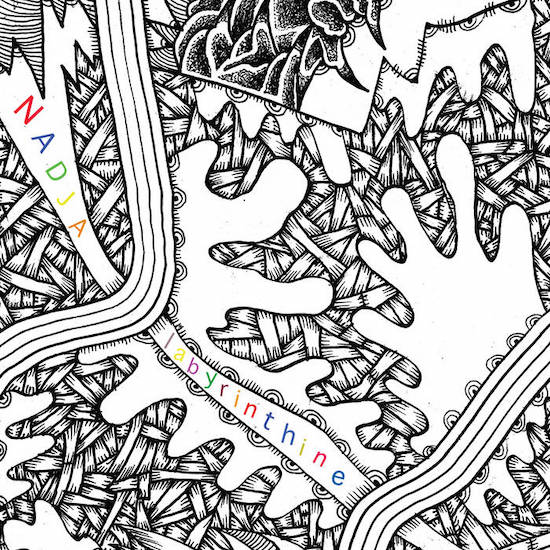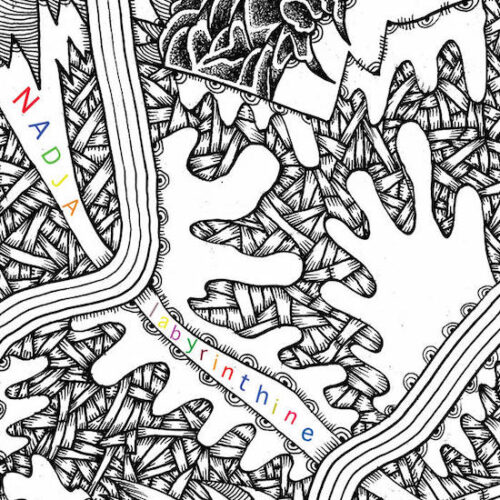It seems daft to declare that Nadja are on a roll right now because they pretty much have been for nigh-on twenty years. Even so, as part of a vast and ever-sprawling discography, the drone-metal architects’ last couple of albums (not counting split releases, live recordings or digital-only thingamajigs) have stood out deservedly.
For one thing, their 2021 appearance on the Southern Lord label felt long overdue. The imprint is regarded by the behoodied brethren as a benchmark for high-quality heaviness. Hopefully this won Nadja some of the additional followers they deserve. The record itself, Luminous Rot, showcased Aidan Baker and Leah Buckareff’s ability to meld slow, claustrophobic, unfathomably distorted riffs with an almost shoegazey dreaminess. Although no one would go as far as to call it outright accessible, it’s the type of pensive metal that can earn crossover appeal because it isn’t full of poser-ish testosterone and is often rather soothing. David Pajo had a production credit, so maybe some Slint-heads bought it too.
It was followed, in February of this year, with Nalepa. That one was released on a smaller label (Germany’s Midira Records) and those black hoodie wearers and Pajo disciples who stuck around will have found the duo joined by drummer Ángela Muñoz Martínez for a spacey and meditative live-in-the-studio jam.
Next up is Labyrinthine. In place of Baker’s often whispery vocal presence (though it was absent from the instrumental Nalepa), each track here uses a different guest vocalist. Don’t tell Southern Lord but the opening song is more ferocious than anything on Luminous Rot. It sees Alan Dubin (Gnaw, Khanate, etc.), sounding as anguished as ever, as he screeches over deep, fuzzy, sluggish riffs and sparse programmed beats.
Second track ‘Rue’ mellows the mood to a certain extent. While it still contains repeated, rumblesome guitar strokes, it has a bonier and creaking style suitably complemented by Rachel Davies from Esben And The Witch. Speaking of witches, one can easily imagine this being played during the end credits of a lowkey, skin-crawling horror flick which culminates in its antiheroine, whether innocent or genuinely possessed of Satanic powers, burning horribly at the pyre.
Denser is ‘Blurred’ which begins with Lane Shi Otayonii of Elizabeth Colour Wheel serenading wordlessly over harsh white noise. About four minutes in, Nadja kick into some thundering drone-metal licks as Otayonii sings more comprehensibly, yet still in a spirit-like fashion, about a haunting memory or some such thing and the swirling layers gradually build. It’s the kind of song that would surely have Hydra Head Records sniffing around for a piece of the action, had the esteemed post-metal label not wound down its operations.
‘Necroausterity’ is the longest song here and the one that really threatens to suck the listener into a Clive Barker nether-dimension. (Although, of course, perhaps we’re already there…) A large part of this is down to the presence of Dylan Walker from Full Of Hell. He puts in a typically terrifying performance that’ll bite through your bones as easily as a freezing cold, tundra-famished polar bear. As such, it’s easily the most “difficult” listen on Labyrinthine. For some, it will therefore be received as the climactic, masochistic highlight of the whole damn set. Others might find less delight in listening to someone attempt to vomit up his own soul for nearly twenty minutes. But each to their own.
It’d be wrong to suggest there is no coherence here but, unlike some of Nadja’s more monolithic records, Labyrinthine is defined by the very different and distinctive flavours of its four separate slabs. This doesn’t come solely from the varying styles of the individual guest singers but also the material with which they’ve been asked to work. It’s further evidence of Nadja’s ongoing mission to keep pushing themselves and the ways in which they forge their distinctive ambient-doom creations.



